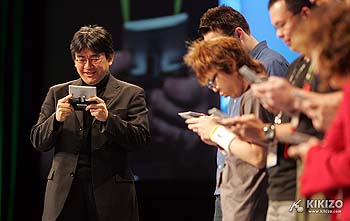Big Three Push Online in Next-Gen
Their approaches may be very different, but Sony, Microsoft and Nintendo will all feature be making online a core component of their new machines.
If you're not online yet, all three hardware manufacturers are going to do what they have to to get you online. Sony, Microsoft and Nintendo have grand plans for their online services going forward, and they hoping to get more people to join their communities.
Of the three, Microsoft has been the most aggressive. Xbox Live is already a winner, with more than 2 million people paying to play games and communicate online. For the next round, the company is hoping to get even more people involved.
"It is our goal in the next generation to have one out of every two Xbox 360s connected to the Internet," said Peter Moore, vice president at Microsoft, speaking at this week's International Games Summit in London.
Xbox 360 owners will be able to join the Live community in two ways: the free Silver service, which lets you use all the communication features; and the subscription-based Gold service, which is closest to the current Xbox Live and includes all the functionality of the Silver service and also lets you play games online.
Sony has been less clear about its plans, but Sony's European boss, David Reeves, outlined a long-term vision for the company at the conference that sees content providers from other entertainment fields joining forces to provide customers with a broader spectrum of content.
Reeves stressed that this is not something that the company is preparing to announce, but rather an idea Sony is mulling and bouncing around with other content providers.
More immediately, Sony is expected to grow its own online community with the transition from PlayStation 2 to PlayStation 3 into something more cohesive and similar to Live.
PSP and PlayStation 3 will also be able to communicate over the Internet, opening up a range of possibilities, such as the use of the PSP as a portable terminal for getting at the content stored on your PlayStation 3.
Nintendo, a longtime sceptic of the economics of online play, is now going in whole hog. The company is planning to roll out more than a thousand WiFi hotspots in Japan by the end of the year where DS owners will be able to get online for free.
How things will unfurl in North America and Europe is still a mystery, but unofficial rumblings indicate the Nintendo is trying to make similar hotspots available outside of Japan.
Apart from the DS, Nintendo is also keen to stress how wireless connectivity will be used for Revolution. The console will include WiFi support for connecting to the DS and other local peripherals and going online.
More importantly perhaps, through Revolution's Virtual Console you'll be able to download and play games from Nintendo past consoles, including the NES, SNES and Nintendo 64. (Revolution will also play GameCube and, of course, Revolution discs.)
Despite all this talk, though, online gaming still has major hurdles ahead of it. Less than 10 per cent of consoles are currently used for online gaming, so the trick is for Sony, Microsoft, Nintendo and third party publishers to come up with the right ideas that will make customers take the plunge.
And as Peter Moore said in London this week, "Content is king."
Alex Wollenschlaeger
Editor, Kikizo Games








 Satoru Iwata Video Interview - the late Nintendo president spoke with Kikizo in 2004 as 'Nintendo Revolution' loomed.
Satoru Iwata Video Interview - the late Nintendo president spoke with Kikizo in 2004 as 'Nintendo Revolution' loomed. Kaz Hirai Video Interview - the first of Kikizo's interviews with the man who went on to become global head of Sony.
Kaz Hirai Video Interview - the first of Kikizo's interviews with the man who went on to become global head of Sony. Ed Fries Video Interview - one of Xbox's founders discusses an epic journey from Excel to Xbox.
Ed Fries Video Interview - one of Xbox's founders discusses an epic journey from Excel to Xbox. Yu Suzuki, the Kikizo Interview - we spend time with one of gaming's most revered creators.
Yu Suzuki, the Kikizo Interview - we spend time with one of gaming's most revered creators. Tetris - The Making of an Icon: Alexey Pajitnov and Henk Rogers reveal the fascinating story behind Tetris
Tetris - The Making of an Icon: Alexey Pajitnov and Henk Rogers reveal the fascinating story behind Tetris Rare founders, Chris and Tim Stamper - their only interview? Genuinely 'rare' sit down with founders of the legendary studio.
Rare founders, Chris and Tim Stamper - their only interview? Genuinely 'rare' sit down with founders of the legendary studio. The History of First-Person Shooters - a retrospective, from Maze War to Modern Warfare
The History of First-Person Shooters - a retrospective, from Maze War to Modern Warfare